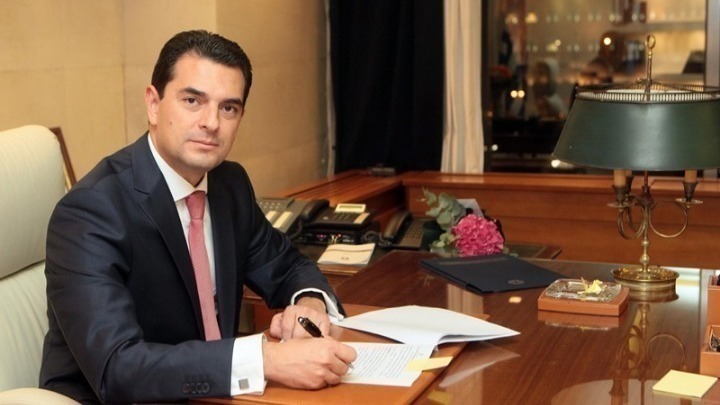
“We are prepared for the winter, the government will not let households get cold” the Minister of Energy and Environment Kostas Skrekas assured SKAI tv. “We have doubled the capacity of Revythoussa with a new floating tank, we have doubled the power generation from lignite and we have the possibility to use oil in five natural gas plants,” he explained.
Mr. Skrekas added, however, that saving energy must be part of our daily life, as in Germany and Italy, but in June – July we had a significant reduction in consumption. “In July, the reduction in consumption exceeded 15% in one month,” he said.
“All of Europe is worried and fretting about the coming months. It looks like we’re going to have a very difficult winter due to Russia’s strategy of strangling Europe’s energy supply by reducing gas flows and driving up prices. Our government saw the problem very early on, and created a safety net for household consumers and SMEs.
“Absorption of increases at least 80%”
The government’s commitment is to absorb at least 80% of the increases in energy for as long as necessary, he repeated. “We will absorb 89% of the increase for September for smaller restaurants and shops, hair salons, convenience stores. In the larger companies we absorb 50 to 55% of the increase, while a part of the increase is deducted from income tax,” he noted.
Mr. Skrekas clarified that “we are examining new financial tools beyond the subsidy for medium and larger companies to support them vis-à-vis increased energy prices”.
“In September alone, we will subsidize households with 1.1 billion euros for just that month. It is the biggest subsidy that has probably ever been given,” noted the minister.
“Net Charges”
The government has obliged the providers to clear charges, the minister reminded, the Regulatory Authority for Energy-RAE has a table with comparisons of providers’ tariffs on its website, while by government law the consumer can change provider free of charge if he has paid the previous bill. Price differences between providers do not exceed 20%, he estimated. In September an average household with 400 kilowatts would pay almost 350 euros for electricity alone, after the government subsidy the amount payable drops to 60 euros.
Latest News

IMF: US Tariffs Shake Global Economy, Outlook Downbeat
IMF slashes global growth forecast to 2.8% as U.S. tariffs create uncertainty and ‘negative supply shock

First Step Towards New Audiovisual Industry Hub in Drama
The project is set to contribute to the further development of Greece’s film industry and establish Drama as an audiovisual hub in the region

Airbnb Greece – Initial CoS Ruling Deems Tax Circular Unlawful
The case reached the Council of State following annulment applications filed by the Panhellenic Federation of Property Owners (POMIDA)

Mitsotakis Unveils €1 Billion Plan for Housing, Pensioners, Public investments
Greek Prime Minister Kyriakos Mitsotakis has announced a new set of economic support measures, worth 1 billion euros, aiming to provide financial relief to citizens.

Alter Ego Ventures Invests in Pioneering Gaming Company ‘Couch Heroes’
Alter Ego Ventures' participation in the share capital of Couch Heroes marks yet another investment by the Alter Ego Media Group in innovative companies with a focus on technology.

Corruption Still Plagues Greece’s Driving Tests
While traffic accidents continue to claim lives on Greek roads daily, irregularities and under-the-table dealings in the training and testing of new drivers remain disturbingly widespread

Pope Francis Died of Stroke and Heart Failure Vatican Confirms
As news of the official cause of death spread, tributes poured in from across the globe. The 1.4 billion-member Catholic Church is united in grief, remembering a pope who championed inclusion, justice, and compassion

Increase in Both Museum Visits, Revenues for 2024
As expected, the Acropolis was the top archeological site in the country, followed by Sounion, Mycenae, the ancient theater of Epidaurus, and Vergina in northern Greece

Where Greece’s Tourists Come From: A Look at 2025’s Top Visitor Markets
The United Kingdom continues to hold the top spot as the largest source of incoming tourism, with 5.6 million seats booked for Greece this summer — up 2.2% from last year. This accounts for 20% of all international air traffic to Greece

Pope Francis: A Pontiff Who Reshaped the Papacy and Sparked a Global Conversation
His first words from the balcony of St. Peter’s Basilica—“Brothers and sisters, good evening”—set the tone for a pontificate that would challenge norms, favor mercy over dogma, and bring the papacy closer to the people.












![Πλημμύρες: Σημειώθηκαν σε επίπεδα ρεκόρ στην Ευρώπη το 2024 [γράφημα]](https://www.ot.gr/wp-content/uploads/2025/04/FLOOD_HUNGRY-90x90.jpg)



![Ξενοδοχεία: Μεγάλο το ενδιαφέρον για επενδύσεις στην Ελλάδα – Η θέση της Αθήνας [γραφήματα]](https://www.ot.gr/wp-content/uploads/2025/03/Athens-hotels-90x90.jpg)
























 Αριθμός Πιστοποίησης
Αριθμός Πιστοποίησης